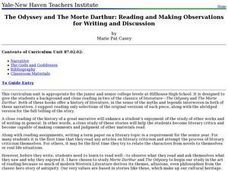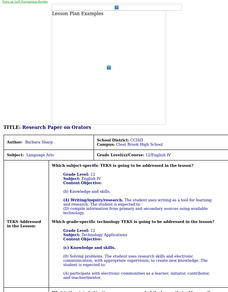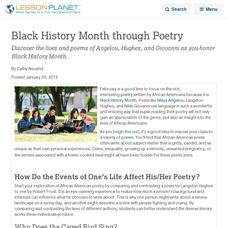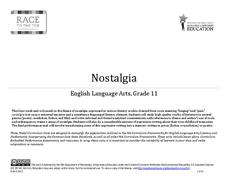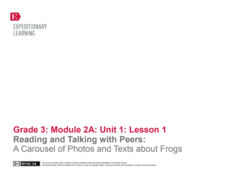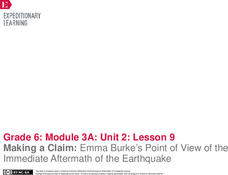Curated OER
Powerful Poetry
Young scholars examine Haiku poems and analyze their meanings. They create a whole class Haiku, then develop their own poems.
Curated OER
This Isn't Your Little Sister's Poetry: Analyzing and Understanding a Variety of Acclaimed Poets
Eleventh graders are introduced to various basic and advanced poetic devices. They read several poems and practice identifying poetic elements. They identify at least two different poems and substantiate why they belong in the canon.
Curated OER
Friendly Patter Poetry
Students create a free from poem on the topic of friendship. They read examples of free form poetry to gather ideas. Through the use of a graphic organizer, students generate a list of friendship characteristics which is used to create...
Curated OER
Poetry III--Haiku Writing
Learners create and solve haiku riddles. In this haiku writing lesson, students work in groups to match a haiku to an illustration. Learners write haiku and assess themselves and their peers.
Curated OER
Art to Zoo: Kiting Up The Sky: The Vehicles of Understanding
Learners gain perspective on the importance of kites by reading about and discussing how kites have been used throughout history. In this kite exploration lesson, students follow instructions to construct a kite to assist them in...
Curated OER
The Odyssey and The Morte Darthur: Reading and Making Observations for Writing and Discussion
Students read "The Odyssey" and "The Morte Darthur". In groups, they research the gods and goddesses of Greek mythology and the history of the places mentioned in the stories. Individually, they are to write a paper about a hero they...
Curated OER
Research Paper on Orators
Twelfth graders identify the difference between a primary and a secondary source, and use writing as a tool for learning and research. They compile information from primary and secondary sources using available technology.
National Endowment for the Humanities
The Poet's Voice: Langston Hughes and You
Middle schoolers complete a unit of lessons that explore the poetic voice of Langston Hughes. They define voice, read and analyze various poems by Langston Hughes, and complete journal entries for each instructional activity.
Curated OER
Love That Dog and Hate That Cat Teacher's Guide
This teaching guide for Love That Dog and Hate That Cat includes suggestions for how to integrate Sharon Creech's books into a poetry unit, as well as writing activities, discussion questions, and tips for making poetry...
Lesson Planet
Black History Month Through Poetry
Black History Month is a great time to discuss African-American poets in your classroom.
Bully Free Systems
Bully Free Lesson Plans—Eighth Grade
Middle schoolers are likely very familiar with the concept of bullying and cliques. Discuss their experiences and brainstorm ways to handle peer conflict and feelings of exclusion with a poem that focuses on bullying, and a second lesson...
Houghton Mifflin Harcourt
Around Town: Neighborhood and Community: English Language Development Lessons (Theme 3)
Here is a unit designed to support English language development. Scholars speak, move, and write to learn more about topics that focus on community and local concepts. The series of lessons aids to reinforce concepts...
Houghton Mifflin Harcourt
Nature Walk: English Language Development Lessons (Theme 2)
Walking in nature is the theme of a unit designed to support English language development lessons. Scholars look, write, speak, and move to explore topics such as camping, woodland animals, instruments,...
Massachusetts Department of Education
Nostalgia
To prepare for crafting their own memoir, class members examine poetry by Margaret Atwood, Billy Collins, Robert Hayden, and Claude McKay, stories by Richard Rodriquez and Willa Cather, and Barry Levinson's film Avalon. They examine...
Curated OER
Be the Poet
Students work through a Haiku Organizer to determine the characteristics they use to write eight haiku poems on a theme that they choose. They design presentation folders of their completed work.
Curated OER
Poetic Elements
Poetry is all about sound and rhythm. The sound of the words, the rhythm of the lines, and the emotional atmosphere created by these elements and the literary devices poets use, compress whole stories into a few stanzas. The specialized...
Lafayette Parrish School System
Teaching Tone and Mood
Tone and Mood are not synonymous! Introduce young readers to these literary devices with a series of exercises that not only point out the significant differences between the terms but also shows them how to identify both the tone and...
Curated OER
Discovering Walt Whitman’s Timeless Poetry
Explore the work of the great American poet Walt Whitman in your classroom.
Teaching Tolerance
Buddy Share
Here's a project that gives academics the chance to share their opinions on social justice with storytelling, creative writing, or art. Scholars choose what they want to create and are assigned buddies to support their efforts. To...
Curriculum Corner
7th Grade ELA Common Core Checklists
Track your class's progress on all of the ELA Common Core standards with these handy charts. Along the left side, each seventh grade identifier is listed along with the full text of the standard. As you teach, reteach, assess,...
Novelinks
Tuck Everlasting: Similes, Metaphors, and Personification in Imagery
Poetic language is abundant in Natalie Babbitt's beautiful novel, Tuck Everlasting. Learners note the examples of similes, metaphors, and personification they find as they read, and illustrate how the language creates a sensory...
New York State Education Department
Comprehensive English Examination: January 2015
Looking for practice for state standardized testing? Scholars work through a variety of passages and multiple question types in this exam. Questions range from comprehension of auditory passages, reading passages, and poems, as well as...
EngageNY
Reading and Talking with Peers: A Carousel of Photos and Texts about Frogs
Frogs are the theme of a lesson plan that challenges scholars to examine photographs, read informational texts, then ask and answer questions. Scholars work collaboratelively as they rotate through stations, discuss their observations,...
EngageNY
Making a Claim: Emma Burke’s Point of View of the Immediate Aftermath of the Earthquake
Sharpen those pencils; it's time to write! Scholars begin writing the first body paragraph of their literary analysis essays. Additionally, pupils use graphic organizers to analyze a character's point of view from Laurence Yep's...





